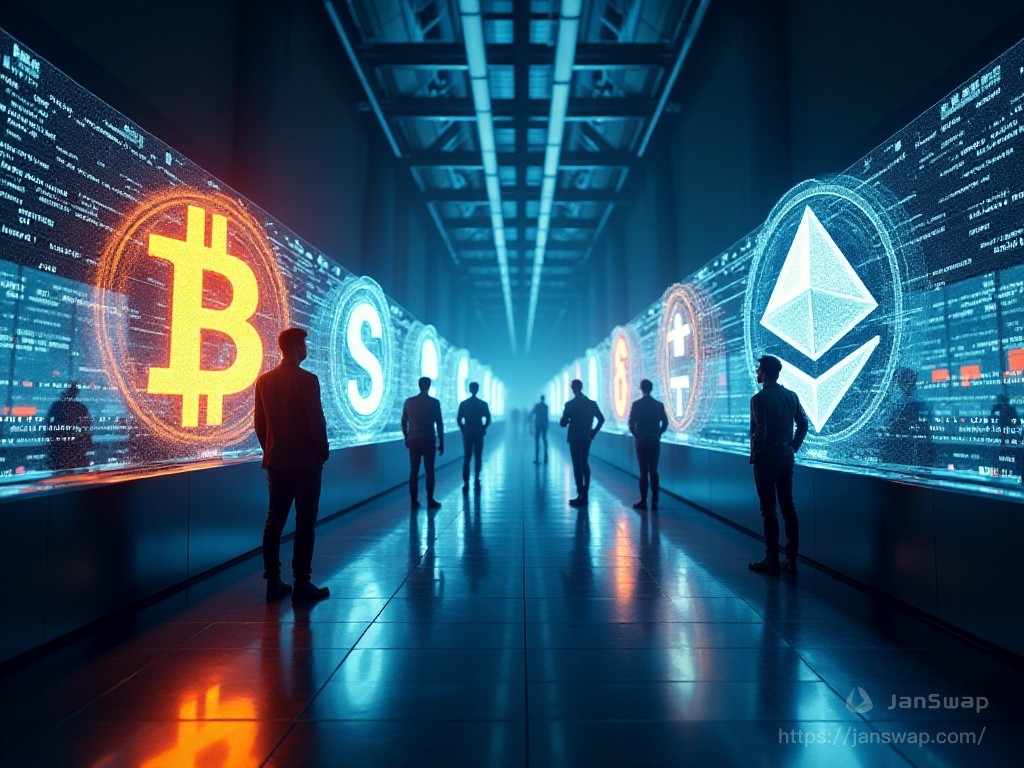

Opening Chat
Hello everyone, I'm a veteran crypto investor who has been following the crypto space since 2017. To be honest, I can still vividly remember the first time I encountered Bitcoin. I had just graduated and learned about this novel digital currency through a friend's recommendation. I found it fascinating at the time. Looking back now, who would have thought that almost 15 years have passed, and the entire cryptocurrency world has undergone revolutionary changes.
As someone who has personally experienced the ups and downs of the crypto world, I have many thoughts to share. I remember when I first entered the space, the entire market was very niche, and not many people around me knew about Bitcoin. The trading platforms were quite rudimentary then, making operations very cumbersome. Every time I wanted to buy coins, I had to research extensively, worried that something might go wrong. Today's newcomers probably can't imagine how hard it was to find a reliable wallet back then, let alone all these fancy DeFi applications we have now.
Origin Story
Let's turn back time to 2009. In this year, a mysterious figure called Satoshi Nakamoto quietly released Bitcoin. This timing was particularly interesting as it came right after the 2008 financial crisis. The global economic situation was poor then, and people's confidence in the traditional financial system was severely shaken. Against this backdrop, Bitcoin's emergence was like a breath of fresh air, bringing people a completely new possibility.
Speaking of Satoshi Nakamoto, no one knows who he (or they) really is to this day. This legendary figure pioneered a new era with a simple yet elegant idea. He left this message in Bitcoin's genesis block: "The Times 03/Jan/2009 Chancellor on brink of second bailout for banks." This quote from The Times headline suggested his motivation for creating Bitcoin - establishing a monetary system independent of centralized institutions.
Bitcoin was really "down-to-earth" back then. Mining could be done with ordinary home computers, without needing today's specialized mining rigs. I remember an interesting story from 2010 when a programmer bought two pizzas with 10,000 Bitcoin, possibly the first real-world Bitcoin transaction. Wonder what he would think if he knew how much those Bitcoin would be worth today.

Technical Decoding
When it comes to cryptocurrency technology principles, many people find them extremely complex and incomprehensible. Actually, I think we can understand them in more relatable terms.
Imagine having a super secure digital wallet with two keys. One is public, like your bank account number, which you can freely share with others; the other is private, like your password, which must be kept secret. This is the most basic security mechanism of cryptocurrency.
The core of this system is blockchain technology. Simply put, it's a global distributed ledger. Every transaction is recorded in this ledger and cannot be tampered with once recorded. It's like an accounting system that never lies, with all income and expenses clearly recorded.
For example, if you send 1 Bitcoin to a friend, this transaction gets packaged into a "block" and is verified through complex mathematical calculations before being added to the chain. Nodes across the network store this record, ensuring transaction security and transparency.
Early blockchain was like a simple transfer system, but it has evolved significantly now. Especially after Ethereum's emergence, which introduced smart contracts. These are like automated programs running on the blockchain that can execute various complex operations. For instance, if you want to conduct an online auction, you previously needed intermediaries, but now smart contracts can handle it automatically.

Market Evolution
Talking about market changes, it's quite an emotional journey. As of June 2023, there are over 25,000 cryptocurrencies in the market, a staggering number. Moreover, over 40 of them have market caps exceeding $1 billion, a development pace that's hard to keep up with.
When I first entered the space, there were only a few mainstream coins: Bitcoin, Ethereum, Litecoin. Back then, if someone understood the principles of these coins, they could be considered a crypto expert. It's different now, with various altcoins emerging constantly, too many even to remember their names.
Market volatility has also been impressive. During the 2017 bull market, I almost thought I was going to get rich. Bitcoin rose from under $1,000 to nearly $20,000 in less than a year, which felt like a dream. But then it crashed dramatically, leaving many people stuck with losses. Such dramatic ups and downs are rare in traditional financial markets but common in crypto.
However, over the years, the market has gradually matured. Institutional investors have entered, and regulations are improving. Exchanges now require real-name verification, and anti-money laundering measures are becoming stricter. While some people may find these changes uncomfortable, they're good for the industry's long-term healthy development.
Particularly noteworthy is the rise of DeFi (Decentralized Finance). This has been perhaps the biggest innovation in recent years. Through smart contracts, we can now implement lending, trading, financial management, and various financial services on the blockchain without traditional financial institutions. While DeFi projects vary in quality, they truly demonstrate blockchain technology's potential.

Application Innovation
Speaking of specific innovative applications, I've recently been following a platform called Chain Scout. This project mainly serves dApp developers by analyzing on-chain data to help them find target users. Honestly, this makes me quite emotional.
I remember when marketing used to rely entirely on guessing user behavior. Now, all transaction data is on-chain, clear at a glance. This level of transparency is unimaginable in traditional industries. Moreover, since the data is public, anyone can develop new applications based on it, providing unlimited possibilities for innovation.
Besides Chain Scout, many interesting applications are emerging. For example, the NFT (Non-Fungible Token) market has brought new possibilities for artistic creation. I know an artist friend who used to sell paintings through galleries with high commissions. Now he sells his work as NFTs directly online, not only eliminating intermediaries but also automatically receiving royalties each time his work changes hands.
Then there's GameFi (Game Finance), combining games with finance. Players' in-game equipment and items become real assets that can be freely traded. This "play-to-earn" model has even become a primary source of income for some people in developing countries.
Social applications are also interesting. Some platforms now use tokens to incentivize social behaviors like posting, commenting, and liking. This way of quantifying user contributions through tokens is somewhat innovative compared to existing social media models.
Of course, innovation also faces many challenges. First are technical issues, with many projects having security vulnerabilities. There have been several incidents of smart contracts being hacked, causing huge losses. Second are user experience issues, as many blockchain applications are still quite complex and not user-friendly enough for average users.

Future Outlook
Looking back at these fourteen years of development, I can't help but ask: Where will cryptocurrency head in the future? There are now over 25,000 cryptocurrencies, but how many will truly stand the test of time?
From a technical perspective, I think future development might focus on several areas: First is solving scalability issues, as current mainstream public chains' processing capacity is still not ideal. Second is the development of cross-chain technology, enabling better interconnection between different blockchain networks. Finally, improving privacy protection technology, ensuring transaction transparency while protecting user privacy.
From an application perspective, I think development will move toward more practical applications. Platforms like Chain Scout are already working to bring blockchain technology into practical application scenarios. We might see more integration between traditional industries and blockchain technology in areas like supply chain management, identity verification, and digital rights management.
Regulation is also an important topic. Many countries are now studying how to regulate cryptocurrency, with some taking supportive stances and others being more strict. I think a relatively unified regulatory framework might emerge in the future, which would benefit the industry's long-term development.
Regarding specific investment opportunities, I'm personally optimistic about projects focused on solving real problems. Pure speculation coins might decrease, while projects with real applications and technological innovation will receive more attention.
After experiencing so many ups and downs over these years, I increasingly feel that maintaining rationality and a continuous learning mindset is particularly important in this field. Don't be confused by short-term price fluctuations, but truly understand the significance behind this revolutionary technology.
The cryptocurrency world changes daily, with new opportunities and challenges constantly emerging. As participants in this field, we need to maintain both enthusiasm and clarity. After all, this isn't just an investment game, but a technological revolution changing the future financial system.
Finally, I want to say, whether you're a veteran who has been in crypto for years or a newcomer just becoming interested in this field, remember: in this rapidly developing field, only continuous learning can keep you up with the times. Investment carries risks, market entry requires caution, but opportunities always belong to those who are prepared.






 Français
Français Deutsch
Deutsch Русский
Русский Português
Português Español
Español Italiano
Italiano Türk
Türk
